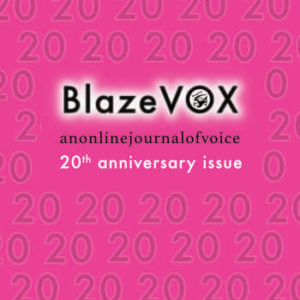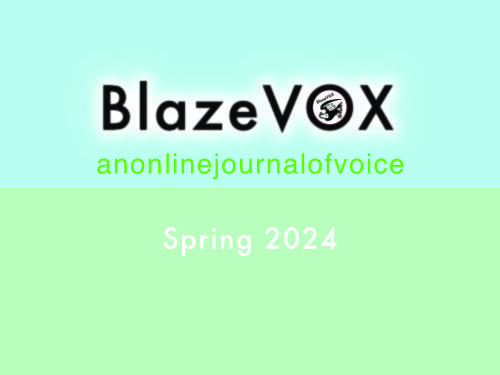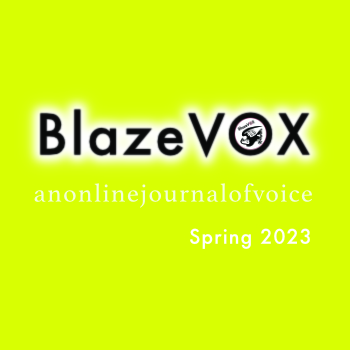IntroductionIntroduction
 Hello and welcome to the 20th anniversary issue of BlazeVOX! Presenting fine works of poetry, fiction, text art, visual poetry and arresting works of creative non-fiction written by authors from around world. Do have a look through the links below or browse through the whole issue in our Scribd embedded PDF, which you can download for free and take it with you anywhere on any device. Hurray!
Hello and welcome to the 20th anniversary issue of BlazeVOX! Presenting fine works of poetry, fiction, text art, visual poetry and arresting works of creative non-fiction written by authors from around world. Do have a look through the links below or browse through the whole issue in our Scribd embedded PDF, which you can download for free and take it with you anywhere on any device. Hurray!Hip Hip Hurray! BlazeVOX is celebrating its 20th anniversary!
It is been our honor and pleasure to read your writing, publish your work, and be a part of your reading life. And in case you are worried that this will be the last issue, never fear! I am pleased to let you know that the spirit and drive of the previous twenty years will continue to live on and thrive for another twenty, at least.
Rockets! Geoffrey Gatza, editor
New & Forthcoming from BlazeVOX books
Robert Creeley on the Poet’s Work in conversation with and photographs by Bruce Jackson
This is an edited transcript of a conversation about the work poets do that Robert Creeley and Bruce Jackson held in Robert Creeley’s home—a converted firehouse in Buffalo’s Black Rock district— the morning of September 6, 2001. One of Bob’s favorite words was “company.” He was always talking about being part of a company—a company of family, of poets, of artists, of deep connections going anywhere in the world, of this group here on this night around this table, eating and drinking and talking, always talking.
Derrida’s In/Voice by Chris Tysh
There is immense talent here — Chris Tysh just gets better and better. With multiple registers and citational energy, the archive is exploded and transformed: we find references to poetry, film, revolution, politics, and philosophy, all effortlessly braided and made dynamic as they speak to one another. With perfectly pitched music, and impeccable form, Derrida’s In/Voice discloses and complicates the knotted conversation between hard and soft power. It’s an awesome book. — Peter Gizzi
POEMS: now and then by Edric Mesmer
These poems fall all too neatly into two sections, the eponymous “now” and “then.” I feel the “now” poems, all from the early months of 2020, share a returning-to with the “then” poems, some of which were written as long as 20 years ago. That they have come together so squarely—so circularly—(at least to me), speaks to a sympathy between then and now. I hope that the reader will also find this to be true. — Edric Mesmer, May 2020
How Proust Ruined My Life & Other Essays by Gloria Frym
In this wonderful assemblage of essays, Gloria Frym liberates the act of reading from the confines of the page. She leads us into the open air where the personal and the public intersect and create a new avenue of possibilities: the book in the hand, the world outside your window. Especially memorable are the probing essays on Jean Toomer and Lorine Niedecker, and her homage to David Meltzer. How Proust Ruined My Life is a timeless book and deserves a wide audience. –Lewis Warsh
For Love (the order of the echoes) by Jared Schickling
How refreshing and enlightening to read a poet who is close reading another poet through the art of poetry (as opposed to commentary, its inverse). There is no greater homage to a great teacher than to take what he held most dear—assonance, sibilance, language, and love—and elevate it into a new consciousness: one that dives deeply into a great poet’s failures in order to reverberate his echoing prosody into new form. Like Creeley—who could turn an angel on a pin by writing tiny poems, or expand a field into a universe by drawing out long ones—Schickling’s poems eschew easy images by making metaphors move the mind into a composted groundlessness. Here, the particulars of daily life are the rich material which Schickling’s poems order into such eloquent echoes. —Kristin Prevallet
From the Lost Land (I-XII) by André Spears
André Spears does not clean up or apologize; in From the Lost Land (I–XII), he blows the genre out of its wine-dark sea. Equal parts Star Wars, On the Road, Deleuzean war machine, and surrealist delirium, this poem-ever-in-progress is literature on steroids, philosophy on acid. It is scandalous, funny, erudite, and endlessly generative. It is an epic without organs. —Miriam Nichols
SHRINKRAP, Litany in Quadraphony by André Spears
And now, as they say, for something completely different. André Spears’ Shrinkrap begins with a claim to simple reportage – the who, what, where, and when that define the parameters of classic reporting – but this report will lead you down the proverbial rabbit hole and into an experience of our current condition unlike any you have had before. —Michael Boughn
Xo: A Tale for the New Atlantis by André Spears
When I first read Xo: A Tale for the New Atlantis, it just blew my socks off—Homer’s cadence and epic sweep, hallucinatory Phil Dickian channelings, hysterically funny post-Pynchonesque deconstructions of American materialism, the swing of the Beats organically fused with Cecil Taylor’s dissonant discipline, East Broadway Run Down as performed in words and sound by Lautréamont, Jarry, Artaud, Derrida and Borges or some combo of super-hip transdimensional aliens; and yet the entire epic a cogent, coherent narrative from start to finish. Spears’s totally unique work is about as far from dry, academic poetry as one can imagine: it rocks, and if you’re willing to venture beyond the gatekeepers’ aesthetic confines, it’s a blast to read.—J.P. Harpignies
Two Dreams of the Afterlife by Kelly Bancroft
The poems in Kelly Bancroft’s Two Dreams of the Afterlife are wild and beautiful as they create worlds from the ordinary made strange, and from the strange made predictable. The materials are everyday objects and events, especially our unavoidable deep connection to figures of popular culture (the Six Million Dollar Man, Wonder Woman, Hal the computer, and John Boy Walton). —Maggie Anderson
It’s not easy for poems to speak to both displacement and belonging but Other Maidens does. These works draw on the nexus of family and culture, weaving myth amongst its truths and truths into the lyric stories of its author. —Lois P. Jones
Departed Quantities: (A) Quantum Epic by John Dolis
In Departed Quantities: (A) Quantum Epic, John Dolis leads us by candlelight down into the rough basement of language, where a “painter in the painting paints / a painting of a painting in the dark.” Dolis’s richly allusive, multivocal language for vision collapses the distance between self and other “such that human being might be more / than we deserve, though infinitely less / than we can dream.” —Tony Trigilio
Endless Spectator by The Screens Suite
Is it such an impossible idea to ascribe placehood to a typographic symbol? In the same way that half a dozen “picture elements” (aka “pixels”) convened at specific coordinates on a screen can indicate the end of a sequence of words in order to afford the reader’s mind a moment to digest what it just read, why can’t the period act as a linguistic watering hole for parched eyeballs?



Comments (0)